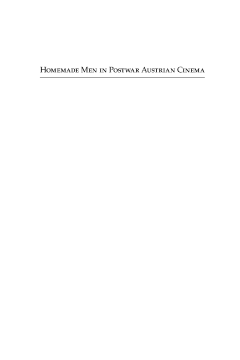
Additional Information
Book Details
Abstract
Despite the massive influx of Hollywood movies and films from other European countries after World War II, Austrian film continued to be hugely popular with Austrian and German audiences. By examining the decisive role that popular cinema played in the turbulent post-war era, this book provides unique insights into the reconstruction of a disrupted society. Through detailed analysis of the stylistic patterns, narratives and major themes of four popular genres of the time, costume film, Heimatfilm, tourist film and comedy, the book explains how popular cinema helped to shape national identity, smoothed conflicted gender relations and relieved the Austrians from the burden of the Nazi past through celebrating the harmonious, charming, musical Austrian man.
Maria Fritsche is a film historian and Associate Professor at the Department of History at the University of Trondheim in Norway, where she is currently investigating the American Marshall Plan film campaign in post-war Europe.
“The book is meticulously researched and demonstrates both insight and fine scholarship. It makes an important part of Austrian film history accessible to the international scholarly community and beyond.” · Film & History
“Fritsche succeeds in her theoretically concise and clearly structured empirical study to show that Austrian postwar film fulfilled an important function in reformulating masculine stereotypes and their social role… Fritsche’s study offers an excellent and essential work on the socio-political effects of cinema in postwar Austria.” · OZP – Austrian Journal of Political Science
“Fritsche has written a solid, detailed, and highly suggestive study of postwar Austrian cinema that makes a number of illuminating points… [Her] observations and arguments make Homemade Men a valuable resource for scholars of cinema and of twentieth century Austrian history alike.” · Monatshefte
“[This book] offers many exciting and fruitful insights and enriches the historical research on masculinity in film. Maria Fritsche furthermore proves herself as a profound expert of postwar Austrian cinema. The study is very readable and makes one curious to watch the films discussed in the book. An index and a filmography of all films produced during the period covered by the author makes it easy to work with the book. One can only wish Homemade Men a broad resonance.” · H-Soz-u-Kult
“Fritsche’s book is… an informative and comprehensive work and the first of its kind to address Austrian Cinema of the period in English language scholarship. It stands well in a growing field of post-war cinema studies focussing on German-language contributions to historical understanding of film and cinema cultures after 1945.” · Historical Journal of Film, Radio and Television
“Offering a detailed overview of popular films in Austria during the era of reconstruction that followed World War II, this book fills a definite lacuna in the scholarship on postwar German-language cinema. It should make a significant contribution to the reconsideration of popular cinema’s role in European cultural history.” · Hester Baer, University of Oklahoma
“Maria Fritsche's rigorous analysis draws on gender, culture, and memory methodologies to contextualize the most successful era of Austrian popular film and articulate how and why it provided powerful representations for nation re/building as it also entertained internationally. Her revelatory and very readable work transforms the understanding of postwar Austrian film as national cinema, German-language product, and as the successor to Austria’s early transnational film history. It is an indispensable text for many aspects of film and Central European study.” · Robert von Dassanowsky, University of Colorado, Colorado Springs. Co-Editor, New Austrian Film
